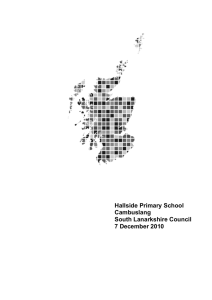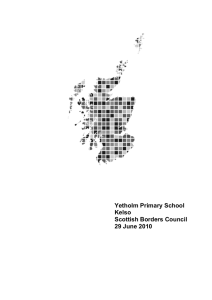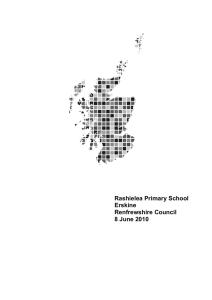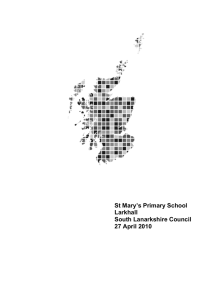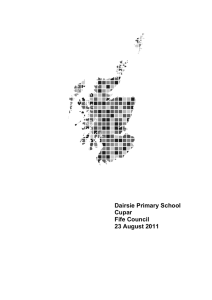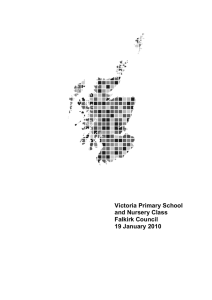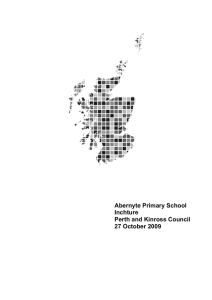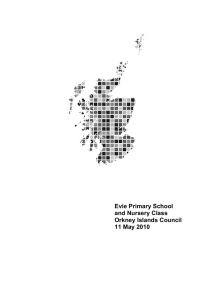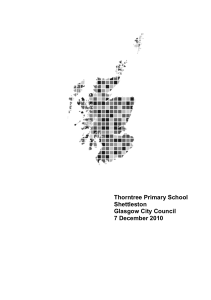Carstairs Primary School South Lanarkshire Council 7 June 2011
advertisement
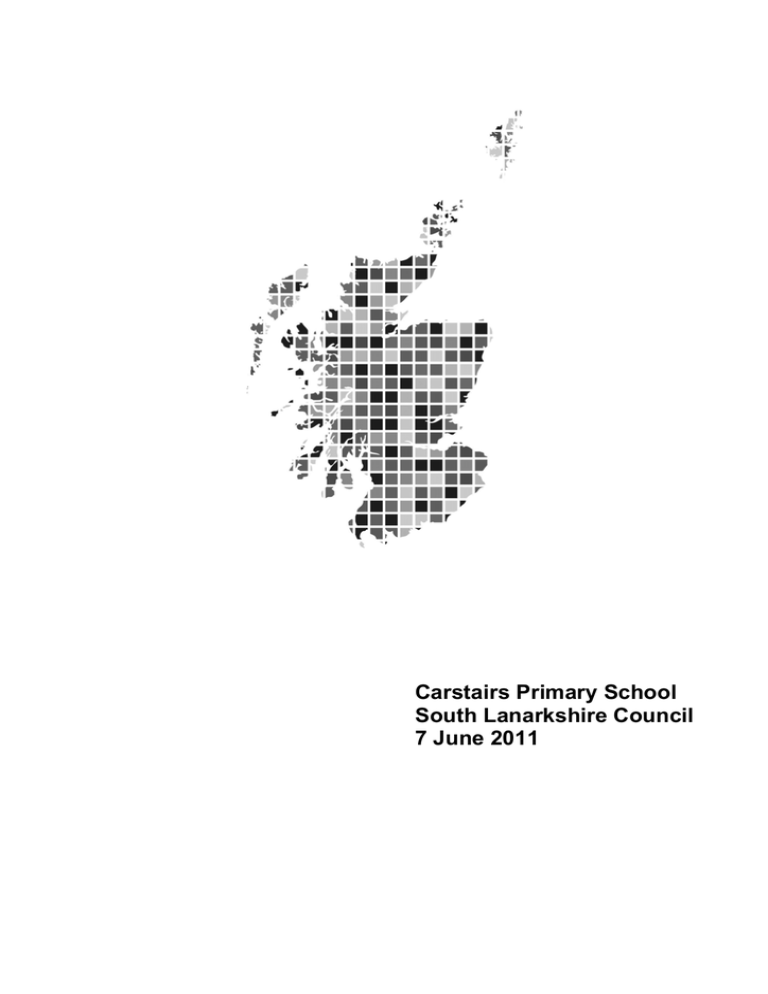
Carstairs Primary School South Lanarkshire Council 7 June 2011 HM Inspectorate of Education (HMIE) inspects schools in order to let parents1, children and the local community know whether their school2 provides a good education. Inspectors also discuss with school staff how they can improve the quality of education. At the beginning of the inspection, we ask the headteacher and staff about the strengths of the school, what needs to improve, and how they know. We use the information they give us to help us plan what we are going to look at. During the inspection, we go into classes and join other activities in which children are involved. We also gather the views of children, parents, staff and members of the local community. We find their views very helpful and use them together with the other information we have collected to arrive at our view of the quality of education. This report tells you what we found during the inspection and the quality of education in the school. We describe how well children are doing, how good the school is at helping them to learn and how well it cares for them. We comment on how well staff, parents and children work together and how they go about improving the school. We also comment on how well the school works with other groups in the community, including services which support children. Finally, we focus on how well the school is led and how staff help the school achieve its aims. If you would like to learn more about our inspection of the school, please visit www.hmie.gov.uk. Here you can find analyses of questionnaire returns from children, parents and staff. We will not provide questionnaire analyses where the numbers of returns are so small that they could identify individuals. 1 Throughout this report, the term ‘parents’ should be taken to include foster carers, residential care staff and carers who are relatives or friends. 2 The term ‘school’ includes the nursery class or classes where appropriate. Contents 1. The school 2. Particular strengths of the school 3. How well do children learn and achieve? 4. How well do staff work with others to support children’s learning? 5. Are staff and children actively involved in improving their school community? 6. Does the school have high expectations of all children? 7. Does the school have a clear sense of direction? 8. What happens next? 1. The school Carstairs Primary School is a non-denominational school. It serves the village of Carstairs and parts of the surrounding district. At the time of the inspection the roll was 106. The school attendance in 2009/2010 was in line with the national average. 1 2. Particular strengths of the school • Happy, well-behaved children who are confident and successful in their learning. • Highly motivated staff who are fully engaged in the life of the school. • The strong sense of community where children, staff and parents value each other and work together well. • Partnership with the local and wider community and other agencies to support and broaden children’s learning experiences. • The commitment and successful approaches to improving the work of the school. • The outstanding leadership of the headteacher. 3. How well do children learn and achieve? Learning and achievement Children are highly motivated. They participate enthusiastically in lessons and show confidence and enjoyment in learning. Children take responsibility for aspects of their own learning. They choose the types of tasks they want to engage in and are confident in giving their views on their learning. They evaluate their own performance and can identify what they have to do to be successful in activities. They work very well independently, in pairs and together in small groups. They show well-developed skills in listening to, and learning from, each other. They work collaboratively, sharing responsibilities and apply problem-solving approaches to finding ways of tackling tasks. From 2 the early stages, children are using effectively their information and communications technology skills across the curriculum. For example, children have established a school website which they manage themselves. Children in P6/7 make their own films related to their topic work. All children are developing excellent citizenship and enterprise skills across a variety of activities, within and outwith the school. For example, children have created and sold African-themed jewellery. Working with local community groups and businesses, they have produced a recipe book. Children’s very good work in sustainability has led to the school achieving a green flag from Eco-Schools Scotland. Across the school, children are developing a very good understanding of how to keep fit and eat healthily. They can express themselves very well through art and design and music. Children perform confidently in school shows and at assemblies. They take on responsibilities readily, for example, as members of the pupil council, health and eco groups, librarians, as Junior Road Safety Officers and as buddies. Children have developed very effective fundraising skills. Almost all children are making very good progress in reading, writing and mathematics. The school has maintained high standards of achievement over recent years. Children listen very well to each other and to their teacher. They talk confidently for a wide range of purposes. Children enjoy reading and read with confidence and fluency. They can talk at length about their favourite types of books. At all stages, children link their learning very well to different areas and write at length across a wide range of relevant topics. Children produce clear, well-structured writing of high quality. In mathematics, children use their mathematical skills very effectively to solve problems. They can apply these skills across the curriculum. Almost all children carry out written and mental calculations accurately and can explain how they reached an answer. They use websites and real-life experiences to gather information. Children in P6/7 have used their budgeting skills to estimate the cost of a band tour. 3 Curriculum and meeting learning needs The curriculum reflects well the principles and entitlements of Curriculum for Excellence. It provides children with a broad and stimulating range of educational experiences. Staff take very good account of the experiences and outcomes and children’s own interests to plan relevant and well-structured programmes of learning in, and across, curricular areas. They help children to make meaningful links across the different areas of learning. The curriculum gives children very good opportunities to develop and use their skills in literacy, numeracy and health and wellbeing in different and challenging situations across their learning. All children benefit from a minimum of two hours of good quality physical education each week. The school has very good arrangements for supporting children coming into school from nursery and for those moving on to secondary school. The school is meeting children’s learning needs very well. Well-planned tasks and activities provide the right support and level of difficulty for almost all learners. Teachers give clear explanations and use questioning very well to check children’s understanding and challenge their thinking. They should continue to build on existing good practice to ensure consistency across the school. Teachers set regular and appropriate homework tasks. Careful tracking of children’s progress helps staff identify children who need additional support. Children talk confidently about their strengths and their next steps in their learning. The school has very effective approaches for identifying and supporting children who require additional help with their classwork. Teachers, support and specialist staff work very effectively together to support children who need additional support. Children and parents are well involved in reviewing and updating learning targets within children’s individualised educational programmes. 4 4. How well do staff work with others to support children’s learning? The school works very effectively with the supportive Parent Council. Parents make valuable contributions to the life and work of the school. Staff seek and respond to parents’ views on a wide range of aspects, including learning and school improvement. They organise workshops on Curriculum for Excellence which inform and engage parents in their children’s learning. Children take an active role in these workshops. Parents contribute well to a working group on assessment. Staff provide helpful information through newsletters, progress reports and parents’ events, such as ‘Tea with the teacher’. Parents feel that communications between the school and families are highly effective. The school’s very good partnerships with other professionals help to provide care and support to children who need additional help. Parents are consulted fully about health education. There are appropriate procedures in place to respond to any complaints and concerns. The school has very well-established links with local community groups which help improve children’s learning experiences. 5. Are staff and children actively involved in improving their school community? Staff demonstrate a strong commitment to continually improving the work of the school. Children, staff, parents and the community feel involved and play an active role in improving the school. Children have many opportunities to have a say in how to improve their learning experiences and other aspects of school life. Staff are skilled in reflecting on their practice and evaluating the success of new initiatives. This approach is an integral part of their daily practice. All teachers play a key role in developing learning together in learning communities and working groups. These approaches help staff to share good practice and to learn from each other. The headteacher monitors the quality of the school’s work in a number of highly effective ways. She involves staff fully and helps them bring about improvements through support and challenging advice. The 5 headteacher and staff track children’s progress closely. The headteacher meets with children to get their views on their progress and the quality of their learning experiences. 6. Does the school have high expectations of all children? The school has a strong culture of achievement and improvement. Children are very proud of Carstairs Primary School and they welcome visitors. Staff have high expectations of children’s achievements, behaviour and attendance. Children respond very positively to these expectations and have high expectations of themselves. Staff are highly committed to the care and welfare of all children and are knowledgeable about child protection procedures. The school places a strong focus on recognising and celebrating children’s achievements. Children receive a range of awards for their achievements in and out of school. The school encourages children to understand the importance of a healthy lifestyle. Children have good opportunities to participate in religious observance and worship through regular assemblies and visits to the local church. These reflect the views and beliefs of individuals and ensure the promotion of equality and diversity. 7. Does the school have a clear sense of direction? The headteacher provides outstanding leadership and provides a very clear sense of direction for the school. She has established a clear and ambitious vision for the school with all staff, parents and children, and strong teamwork. As a result, staff demonstrate a strong sense of mutual responsibility and take on leadership roles in bringing about improvements to learning and teaching. Staff encourage children to lead initiatives. The school is very well placed to maintain its high standards in all areas and to continue to improve its work. 6 8. What happens next? The inspection team was able to rely on the school’s robust self-evaluation. As a result, it was able to change its focus during the inspection to support further improvements within the school. The school provides a very good quality of education. Therefore, we will make no further visits in connection with this inspection. The education authority will inform parents about the school’s progress as part of the authority’s arrangements for reporting to parents on the quality of its schools. We have agreed the following area for improvement with the school and education authority. • Continue to build on the high-quality education already provided. 7 Quality indicators help schools and nursery classes, education authorities and inspectors to judge what is good and what needs to be improved in the work of a school and a nursery class. You can find these quality indicators in the HMIE publications How good is our school? and The Child at the Centre. Following the inspection of each school, the Scottish Government gathers evaluations of three important quality indicators to keep track of how well all Scottish schools and nursery classes are doing. Here are the evaluations for Carstairs Primary School. Improvements in performance Learners’ experiences Meeting learning needs very good excellent very good We also evaluated the following aspects of the work of the school. The curriculum Improvement through self-evaluation HM Inspector: Noreen Phillips 7 June 2011 8 very good excellent When we write reports, we use the following word scale so that our readers can see clearly what our judgments mean. excellent very good good means means means satisfactory weak unsatisfactory means means means outstanding, sector leading major strengths important strengths with some areas for improvement strengths just outweigh weaknesses important weaknesses major weaknesses If you would like to find out more about our inspections or get an electronic copy of this report, please go to www.hmie.gov.uk. Please contact us if you want to know how to get the report in a different format, for example, in a translation, or if you wish to comment about any aspect of our inspections. You can contact us at HMIEenquiries@hmie.gsi.gov.uk or write to us at BMCT, HM Inspectorate of Education, Denholm House, Almondvale Business Park, Almondvale Way, Livingston EH54 6GA. Text phone users can contact us on 01506 600 236. This is a service for deaf users. Please do not use this number for voice calls as the line will not connect you to a member of staff. You can find our complaints procedure on our website www.hmie.gov.uk or alternatively you can contact our Complaints Manager, at the address above or by telephoning 01506 600259. Crown Copyright 2011 HM Inspectorate of Education
